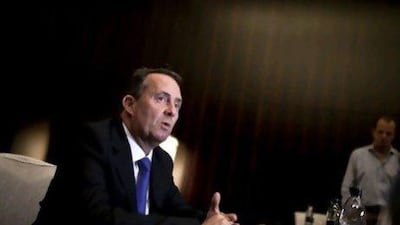We've seen the best and the worst of journalism showcased in the Emirates over the past few weeks. Specifically, the coverage of trips to Dubai by Dr Liam Fox, a British politician, and Kim Kardashian, an American reality TV star.
Sadly, the great investigative journalism that uncovered Dr Fox's visit is facing economic extinction. The vacuous reporting of Ms Kardashian's sojourn, however, has a healthy financial future. This matters, because good journalism performs some pretty important functions for society. We'll look at possible solutions in a minute, but first a recap.
Dr Fox resigned as the UK defence minister last week after dogged investigative journalism suggested that his conduct fell short of the standards demanded by high office. Reporters at The Guardian, The Times and The National newspapers were particularly effective. Individually, they produced different pieces of the jigsaw. Collectively, they suggested that Dr Fox's dealings with a close friend, Adam Werritty, raised troubling issues.
A trip to Dubai in June of this year proved key. It went unnoticed at the time, before The National broke the story in late July, reporting that Dr Fox and someone at the centre of a controversial business deal involving the British government had met at the Shangri-La hotel.
Two things about that Dubai meeting were red flags to journalists. First, that Mr Werritty had brokered and attended the meeting. He does not work for the British government, so why was he involved? Second, that Harvey Boulter, one of the businessmen at the meeting, claimed Mr Werritty told him to deny that the meeting ever took place.
Then there was the issue of who was paying for Mr Werritty to fly around the world with Dr Fox. Again, diligent investigative journalism revealed that Mr Werritty had used charitable donations from companies linked to the defence industry to pay for his travel expenses, potentially compromising the integrity of Dr Fox's government dealings.
In his resignation letter on Friday, Dr Fox admitted: "I mistakenly allowed the distinction between my personal interest and my government activities to become blurred." There are far more details to this story - the point here is to show the effectiveness of good, old-fashioned investigative journalism.
Then there's Ms Kardashian. She was in Dubai last week to promote a new milkshake store, receiving huge media coverage. A quick search on Google News reveals 573 articles about the visit. Even The National - arguably the UAE's most serious newspaper - has at least nine stories about Ms Kardashian's visit on its website.
Of course, I'm just as guilty. My radio show is supposedly about business and sport, but I still managed to squeeze in an interview with Ms Kardashian, as well as a 10-minute debate about her trip.
Which brings us back to the economics of journalism. The reality is that celebrity reporting is cheap to produce and extremely popular. The story on Ms Kardashian preparing to leave Dubai was the most read on The National's website on Sunday morning.
By contrast, investigative journalism is expensive to produce and not so popular. The story that revealed Liam Fox's best man, Mr Werritty, had accompanied him on UAE trips did not make the top 10 on The National's website.
This is not a UAE issue; it is a global issue. Nick Davies, an investigative reporter with The Guardian, wrote a book about the problem in 2008.
In Flat Earth News, Mr Davies argues that "where once we were active gatherers of news, we have become passive processors of second-hand material generated by the booming public relations industry and a handful of wire agencies, most of which flows into our stories without being properly checked."
The financial accounts of the The Guardian's parent company demonstrate the extent of the problem: last year it lost £58.6 million.
Print circulation of the newspaper fell 10 per cent last year, mirroring the decline of high-quality broadsheet newspapers throughout the developed world.
There are two possible solutions. One is state-subsidised, the other market-based. Robert McChesney, an influential American media academic and author, argues that government funding is the answer, particularly in the US, where newspapers are either closing down or laying off journalists at an alarming rate.
He says Nordic countries can serve as a model: "That level of subsidy to journalism is found in Scandinavian nations, which are among the freest and most democratic in the world."
James Murdoch, a son of the media magnate Rupert, takes a different view. He argues that the world's best-known, publicly-funded media organisation - Britain's BBC - is part of the problem, not the solution. The reason that privately owned newspapers cannot make money is that they cannot compete with a well-funded rival that gives away its content.
"The expansion of state-sponsored journalism is a threat to the plurality and independence of news provision," he says.
There is no easy answer for journalism. In reality, the best we can probably hope for is some hybrid version of the two.
Richard Dean hosts Tonight on Dubai Eye 103.8 FM and is the author of Sink or Swim? How to Stay Afloat in Tough Economic Times: Business Lessons from the UAE

